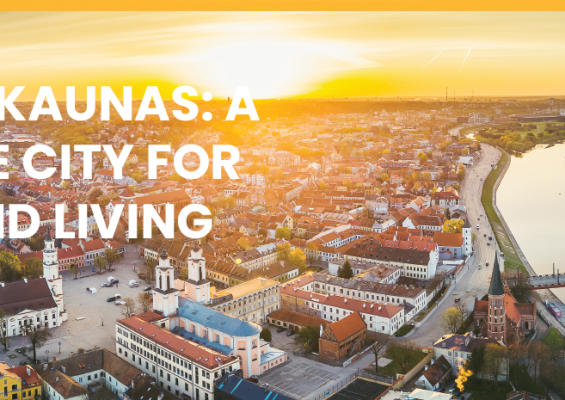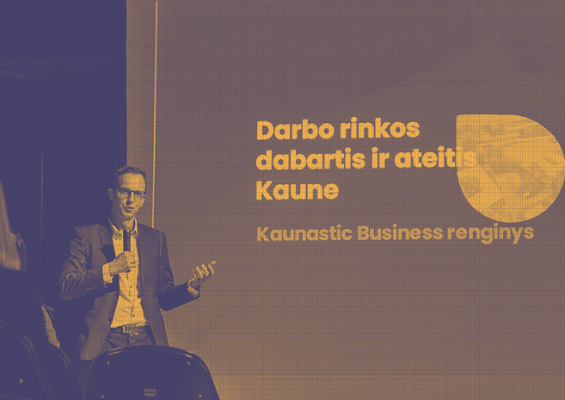Could healthcare institutions – or should they – become a cradle of innovation? This question was analyzed at the Morning Health Talks meeting held in Kaunas by representatives of various organizations, companies and startups related to the ecosystem of health innovation. They looked at the innovation in hospitals from different points of view: the state, business, startups, hospital, patients, investors, and universities.
The regularly held event Morning Health Talks was conceived as a place where parties who create, use and initiate health innovations are invited to a joint discussion to exchange their observations, experiences and ideas over a morning cup of coffee, build relationships and together strengthen the innovation ecosystem of Kaunas as well as the whole of Lithuania.
At the end of November, representatives of the EIT Health Innostars community, Lithuanian University of Health Sciences (LSMU) and Kaunas University of Technology (KTU) gathered for such a meeting, this time focusing on the topic “Health care service providers: a field for innovation development.” Several special guests also shed light on the topic. They spoke about the examples of Denmark, Tel Aviv and the United Kingdom, helping to get acquainted with the vision, assessment of the situation and the insights offered by the representatives of the big pharmaceutical businesses.
As the Director for Public Health, Research and Education at the Hospital of Lithuanian University of Health Sciences Kauno klinikos Dr. Tomas Lapinskas pointed out at the event’s opening speech, the development of innovations from the hospital’s point of view is related to such challenges as creating a safe environment for the development of innovations in medical institutions, helping hospital staff who lack time and involvement, ensuring infrastructure, financing and the necessary competencies.
“Hospitals generate enormous amounts of health data. In order to successfully direct them to the development of innovations, it is necessary to strengthen knowledge on how to accumulate them properly, provide safe access to innovators or researchers, ensure the fulfillment of legal requirements and cyber security requirements,” he said.
What can we learn from the experience of other countries?
Louise Vibjerg Thomsen, innovation representative and commercial adviser at the Embassy of the Kingdom of Denmark and Innovation Center in Tel Aviv, shared knowledge about the practices used in the development of health care innovations in Danish hospitals. Her main message: Denmark’s hospitals are becoming the most important tool that drives the country’s health innovation. Very important state-of-the-art technologies are implemented here, innovation models are strengthened and expanded, internal and external innovation commercialization strategies are successfully applied. The Israeli hospitals – which demonstrate impressive results and have become the main source of inspiration for innovation thanks to a well-developed innovation infrastructure – also draw on their longtime experience in promoting innovation.
“A modern or future hospital must work on developing innovations because this has already become part of the mission of hospitals, alongside the provision of health care services, education and research. And here hospitals play a dual role: they both develop innovations themselves and help businesses to do so,” L. Vibjerg Thomsen said. She emphasized that the benefits of innovations developed by hospitals are greater than solutions created for hospitals. These include education, new competences and better healthcare services for patients.
Commercial Attaché of the Republic of Lithuania at the Embassy of the Republic of Lithuania in the United Kingdom, the Republic of Portugal and the Sultanate of Oman Donata Mauricaitė spoke about similar processes and the strengthened role of universities and hospitals in them in the United Kingdom.
Personalized care is the future
CEO of Roche Lietuva Stefano Volonte drew attention to the cooperation between hospitals and businesses. In his opinion, the transformation of global healthcare is inevitable, as it is already being pressed by enormous challenges: an aging population, globalization, rising healthcare costs and an unprecedented growth in the scope of medical knowledge.
“The current healthcare system is not sustainable. Its future is personalized healthcare that will improve patient outcomes at all stages of care, from early and accurate diagnosis, a more efficient, patient-tailored treatment plan, to better monitoring. Not only innovative diagnostic and treatment tools, but also clinical decision systems, data platforms, and sometimes even the simplest, easy-to-use apps that allow you to be closer to patients, will aid this – and already is aiding – a lot,” S. Volonte asserted.
What can be done to increase innovation in our hospitals?
More unified platforms and legislation facilitating data sharing at national and EU level, refined intellectual property management strategies, building on success stories from other countries, more transparency and openness, more effective digitization of services, and possibly funding based on patient outcomes rather than just services provided – such and similar proposals were mentioned during the event’s panel discussion, when trying to answer the question: what could speed up innovation in Lithuanian hospitals, if all the necessary financial support was available?
As Arnas Karužas, a cardiologist, doctoral student, co-founder and manager of the Ligence startup created in Kaunas, rightly observed, most innovations come from solving a problem, so innovation can sometimes be just one button moved to another place yet bringing about a huge result.
“Both doctors and patients face challenges: doctors and hospital staff want to improve efficiency and accuracy, and patients want security. I think that the provision of services in itself is not the best stimulus for innovation. But what truly stimulates it, is the result-oriented treatment,” A. Karužas pointed out.
His claim was seconded by Kaunas resident Dominykas Milašius, a co-founder of Delta Biosciences, who called to change the Lithuanian mentality of not being good enough and become more ambitious.
“In this room alone, we have representatives of a university hospital, two universities, a pharmaceutical business, and startups, so these organizations alone can become an excellent nucleus of a health innovation accelerator,” D. Milašius noted, having no doubt that this kind of synergy that provides access to the core of the issues could become an interdisciplinary force that would help create and pilot health innovations.



